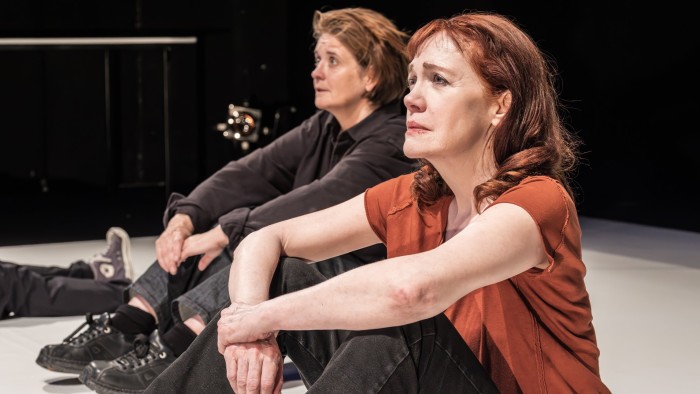Unlock the Editor’s Digest for free
Roula Khalaf, Editor of the FT, selects her favourite stories in this weekly newsletter.
“I sing without hope on the boundary,” says a voice in 4.48 Psychosis. Sarah Kane’s play is a missive from that boundary: an unflinching account of severe depression. It’s painfully frank, exquisitely wrought and shot through with dark humour. Twenty-five years after its premiere, it still feels startlingly original — a unique and shattering piece of work.
This revival (a co-production with the RSC) is particularly highly charged, reuniting the actors and creative team that first staged it in 2000. The person who can’t be here is Kane herself: she died by suicide not long after writing the piece. That desolate fact gnaws at your experience of the play.
But it’s important to recognise — and perhaps easier to see now — the radical aesthetic intent driving the drama. Kane sought to express truth through innovation, splintering form to reflect a broken world. 4.48 Psychosis has striking integrity and ambition: it is a profound, lyrical reflection on mortality and consciousness and on the human need for love, hope and forgiveness. There’s a generosity to that impulse. It’s perhaps closest to Beckett in its staunch honesty and clarity of vision.
Recommended
Key to this is the fragmented, polyphonic structure, which matches form to content, inviting us into the surging mind of its unnamed protagonist and blurring outer and inner worlds. The script floats on the page — no setting, no plot, no timescale — and jackknifes through moods. There are monologues, dialogues and spoken choral passages, but none of them are assigned to any character or characters. It’s down to the director to fathom a route through and sculpt it into tangible form.
 Daniel Evans, Jo McInnes and Madeleine Potter reflected in a giant mirror on the set of ‘4.48 Psychosis’ © Marc Brenner
Daniel Evans, Jo McInnes and Madeleine Potter reflected in a giant mirror on the set of ‘4.48 Psychosis’ © Marc Brenner
Some have responded by shaping the narrative, presenting us with a patient, doctors and friends. This quietly brilliant production by James Macdonald, still definitive in my view, is less literal and embraces the musicality of the piece. It also simply and succinctly draws us into a state of disorientation. Taking a cue from the text — “Here am I and there is my body” — Jeremy Herbert’s set is dominated by a huge slanting mirror, so the audience has a double-perspective throughout.
As the three actors move around the set, sprawl in a chair, curl up on the floor or lie spreadeagled on the table, we watch them and their mirrored selves, forming patterns above like letters on a page. It could be an expression of dissociation; it could be a reflection on the act of translating raw emotion into scripted art. Nigel Edwards’ lighting flicks without warning between a soft blue twilight to a jumpy, pixilated state to stark clinical white.
That splintering of identity and porousness of self is key to the emotional intensity and political import of the piece: the protagonist feels weighted by, and responsible for, the human atrocities in the world. The actors — Daniel Evans, Jo McInnes and Madeleine Potter — convey this beautifully, shifting nimbly through the registers, from sardonic humour to bitter anger to perplexed grief to quiet reflection. They are separate yet a unit as they adopt the concerned tone of medics, rattle off lists of medication and side-effects, or rage at injustice. That they are returning to the piece in their older bodies lends it a further bittersweet quality, particularly as they respond to the final cathartic instruction — “Please open the curtains” — and let the light in.
★★★★★
To July 5, royalcourttheatre.com, then The Other Place, Stratford-upon-Avon July 10-27, rsc.org.uk

